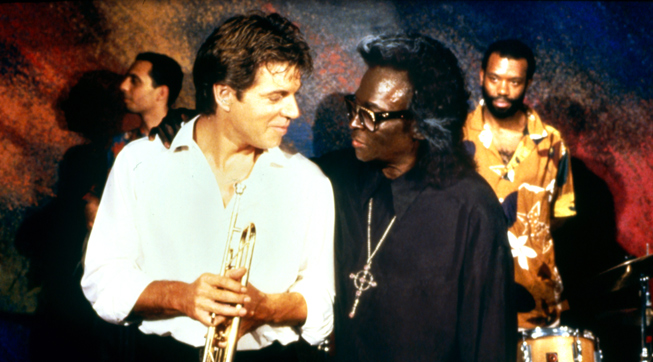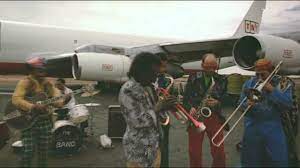


Jazz trumpeter Miles Davis didn’t do a lot of acting in his 65 years of hard playing, hard living and siring “Birth of the Cool.” But filmmakers knew that burning intensity and hoarse-whispered inscrutability would pop off the screen if they could just talk him into signing up.
Aside from a “Miami Vice” episode, the one screen performance of note in Davis’s career was in a Franco-Australian jazz dramedy, “Dingo,” which came out the year Davis died (1991). Like the Outback dog of its title, its a bit unkempt and undisciplined. But this mild-mannered fantasy makes a sweet-spirited love letter to Outback life, Paris and the enduring cool of jazz, as Miles Davis played it.
In 1969, a boy in dusty Poona Flat, Australia’s answer to BFE, interrupts arm wrestling with his mates with a “Didya hear that?”
He’s picked up on the sound of a muted trumpet, a harbinger of the jetliner that passes overhead, causing everybody in this town to convoy out to the airport. A big transport with “TNT” painted on it lands. And out steps this hep cat in long hair, rose-colored glasses and toting a metallic pink trumpet.
Somebody on board had an impulse, decided this was “an interesting place” among all the other many “interesting places” he’s been.
“My name’s Billy Cross, and if you don’t mind, we’d like to play something for you.”
Cross’s band opens up, right there on the tarmac. And little Johnny Anderson’s life will never be the same. He is gobsmacked.
“You seemed tuned to us,” a sympathetic Billy whispers. “If you ever come to Paris, look me up.“
Over twenty years later, Johnny “Dingo” Anderson (Colin Friels of “Darkman” and “Dark City”) practices his horn, listening to it echo across desert valleys. He’s an itinerant fence-mender, handyman and “dogger.” He sets steel traps to kill dingoes, which kill ranchers’ sheep.
He has a wife (Helen Buday) and two little girls, whom he catches up with in between long, dusty work trips. But he gets his ya ya’s out on the stage fronting a country pop jazz band, Dingo and the Dusters. And he keeps his dreams alive by writing Outback essays to his idol over in Paris, stories of how a “three-legged dingo is the worst kind.” He’s survived a trap, learned to sense them and being three-legged, can really only feed on slow domestic sheep. He’s a monster of the ranchers’ (and Johnny’s) creation. And as we see in the movie, one in particular has mastered the art of springing the traps.
The movie meanders a lot, showing us that limping, cagey dingo, introducing that childhood pal (Joe Petruzzi) who grew up to be a successful yacht broker, who still pines after Dingo’s wife Janie. Is she tempted?
But the money sequence is the film’s third act, when the student impulsively takes off in search of his inspiration.
Dutch-Australian director Rolf de Heer never made much of a dent in the North American cinema, making documentaries and the Outback folk comedy “Ten Canoes.” “Dingo” features a little Australian life, the tough and unpleasant work Dingo Anderson does for a living, roaming from ranch to ranch in his ute, with his camper trailer (caravan) and trust cattle dog in tow.
But de Heer’s gift to the cinema might be this film’s portrait of a reclusive jazz legend, years since his last live performance, taking an interest in this kid he inspired and long-time pen pal who has come to Paris to cut it or get cut.
The set-up is borrowed from “Moscow on the Hudson” and other films that used this trope — a jazz player/jazz fan’s pilgrimage to see if he has what it takes.
The music, by Michel Legrand and Miles Davis, leaning hard on Davis’s ethereal, echoey muted trumpet runs, gives “Dingo” the feel of a fantasy, a dream this Outback laborer has and then lives. It’s a beautiful score.
And for all the charms of Friel’s turn in the lead role, it is Davis that you can’t take your eyes or ears off of in their scenes together. He was always a little scary, with a cultivated intensity that Don Cheadle captured in playing him in “Miles Ahead.” He stared people down, even when he wasn’t pulling a gun on them for whatever reason he dreamed up.
Friels and de Heer serve up a Miles Davis who can be sweet, supportive and kind, in addition to seriously intense.
I think the script was going for some sort of analogy between the three legged dingo and Billy Cross/Miles Davis, reaching for a metaphor about Johnny and Billy’s fateful connection long ago, and the role each has to play in the others’ story. I don’t think they got there.
But Davis and Friels, the Outback and the out-of-this jazz by Davis, Legrand and (playing a musician friend of Billy’s) jazzman and actor Onzy Matthews makes “Dingo” worth tracking down and Dark Star gives it a new cinematic lease on life.
Rating: PG
Cast: Colin Friels, Miles Davis, Helen Buday, Joe Petruzzi and Bernadette LaFonte
Credits: Directed by Rolf de Heer, scripted by Marc Rosenberg. A Dark Star re-release.
Running time: 1:49

